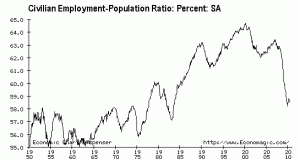The misery accompanying the U.S. recession / depression manifests itself firstly, I think, through the job market. There seems to be an increasing perception that policymakers in Washington and at the Fed aren’t taking the unemployment situation seriously enough. Nonetheless, jobs are certainly on the minds of people who have them and, even moreso, people who don’t have them. We learned yesterday that the declining unemployment rate is actually bad news. Why? Well, in order to be counted as unemployed, a person has to be seeking employment, and consequently so-called discouraged workers, people who are no longer looking for work, do not count as unemployed. And would-be workers are pretty darned discouraged.
This gives us a fundamental measurement problem, how can we determine how bad the employment situation really is? One common way to tackle it has been to track the total adult population in the workforce.

As you can see, the picture isn’t a pretty one. Over time, there has been a steady increase as (presumably) more women have entered the workforce. After peaking at almost 65% about 10 years ago, we’ve seen a dip and then a plunge. You can imagine all sorts of reasons why the employment-to-population ratio is a problematic metric, it’s hard to rationalize that drop as anything but bad news for the working man. Certainly, the itty-bitty recent upward movement is encouraging, but it would seem we have a long way to go.
So, what’s the solution? One approach for would-be workers is to become very well educated. But as we saw earlier in the week, even the top law schools are having some trouble placing their students. Their odd solution is to change their grading schemes and pump up student GPAs.
Law schools seem to view higher grades as one way to rescue their students from the tough economic climate — and perhaps more to the point, to protect their own reputations and rankings. Once able to practically guarantee gainful employment to thousands of students every year, the schools are now fielding complaints from more and more unemployed graduates, frequently drowning in student debt.
Well, that seems kind of weird.
If law school isn’t the ticket, what about other graduate degrees? The Wall Street Journal is reporting that the unemployment rate for 20-34 year olds with masters degrees has inched up to 4.2% — well below the national average of nearly 10%, but probably higher than someone with a masters degree feels is deserved. On the other hand, the college-educated class continues to command premium salaries.
So, who is in danger? I came across this piece in The Atlantic that shows the jobs most likely to be outsourced. For those of you who have taken 450, you might be able to craft a model as to why this particular set is vulnerable to outsourcing. For those who haven’t, no better time to start thinking about it.
Did you notice “physicists” on that list?